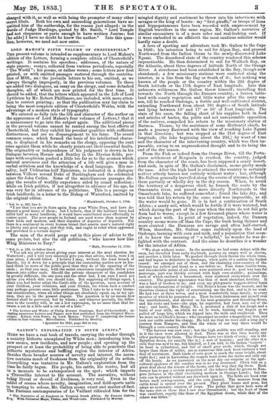LORD MAHON'S FIFTH VOLUME OF CHESTERFIELD.. TEE present volume is
intended as supplementary to Lord Mahon's edition of the Letters, forming a complete edition of Chesterfield's writings. It contains his speeches ; addresses, of the nature of state papers; essays, collected from various periodicals, especially " The World "; his poems, or rather verses ; some letters now first printed, or with omitted passages restored through the contribu- tion of MSS., an 1 the juvenile letters to his son, omitted, as we always thought improperly, in the previous volumes. To these are added two dialogues, an essay on the clergy, and some detached thoughts, all of which are now printed for the first time. It should be added, that the letters which appeared in the Life of Lord Lyttleton by Mr. Robert Phillimore, are included, with more atten- tion to correct printing; so that the publication may lay claim to being the most complete edition of Chesterfield's Works, with the advantage of a modern style of typography.
We entered so fully into the life and character of the author on the appearance of Lord Melion's four volumes of Letters,1- that it is unnecessary to go into the subject again. The additional pieces in the present volume cannot be ranked among the best efforts of Chesterfield, but they exhibit his peculiar qualities with sufficient distinctness, and are no disparagement to his fame. The sound common sense, which formed the basis of his intellectual charac- ter, is displayed in his remarks on the clergy, opposing the cant cries against them while he clearly points out their essential faults. The originality or independence of his judgment is shown in his dialogue between Horace and Bentley in the Elysian fields, per- haps with scepticism pushed a little too far as to the acumen which natural acuteness and the attention of a life will give a man in verbal criticism and the knowledge of a dead language. His mo- rality, half Utilitarian half Epicurean, is indicated in a dialogue between Villiers second Duke of Buckingham and the celebrated miser Sir John Cutler. Some of the miscellaneous passages dis- play the results of worldly experience aided by sound reflection ; while on Irish politics, if not altogether in advance of his age, he was very far in advance of its politicians. This is a passage on Irish landlords, in a letter to the Bishop of Waterford, omitted by the original editor.
" Blackheath, October 1, 1764. "Vol. iv. p. 392, line 3.
"I see that you are in fears again from your White Boys, and have de- stroyed a good many of them; but I believe, that if the military force had killed half as many landlords, it would have contributed more effectually to restore quiet. The poor people in Ireland are used worse than negroes by their lords and masters, and their deputies of deputies of deputies. For there is a sentiment in every human breast that asserts man's natural right to liberty and good usage, and that will, and ought to rebel when oppressed and provoked to a certain degree."
The man of the world peeps out in this piece of advice to the same prelate, but also the old politician, " who knows how like Whig Ministers to Tory."
" Vol. iv. p. 138, to follow line 8.
"You ask my advice about giving your interest at the next election for Waterford ; and I will very sincerely give you that advice, which, were I in your place, I should follow. I believe I may, without the least breach of charity, lay it down for a principle that the contending parties now in Ire- land think no more of the public good than they do of the squaring of the circle ; so that you may, with the safest conscience imaginable, throw your interest into either scale. Should the private characters of the candidates be greatly different, the one pure and the other bad, I am sure I need not advise you which side you should take. But supposing all things equal, I think you had better adopt the Castle side of the question, upon account of your children, your relations, and your friends, for whom such a conduct may perhaps procure some little preference. This I take to be a very blame- less consideration, when all other things are absolutely equal, as, in my opi- nion, they are in the present dispute. The question is by no means how Ireland shall be governed, but by whom ; and whoever prevails, the differ- ence to the country will, to use a low expression, be no more than that be- tween a cat in a hole and a cat out of a hole."
• The Letters and Works of Philip Dormer Stanhope, Earl of Chesterfield ; in- chiding numerous Letters and Papers now first published from the Original Manu- scripts. Edited, with Notes, by Lord Mahon. Volume V. completing the former edition in four volumes. Miscellanies. Published by Bentley.
Spectator for 1845, page 904 et seq. " Bath, November 14, 1754.


































 Previous page
Previous page